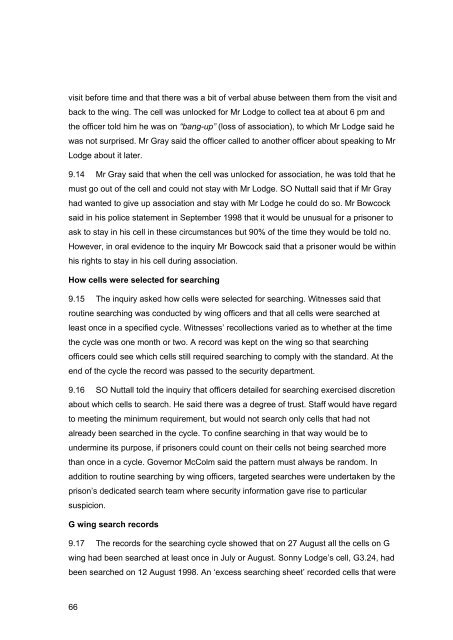Report of the Inquiry into the circumstances of the Death of Bernard ...
Report of the Inquiry into the circumstances of the Death of Bernard ...
Report of the Inquiry into the circumstances of the Death of Bernard ...
Create successful ePaper yourself
Turn your PDF publications into a flip-book with our unique Google optimized e-Paper software.
visit before time and that <strong>the</strong>re was a bit <strong>of</strong> verbal abuse between <strong>the</strong>m from <strong>the</strong> visit and<br />
back to <strong>the</strong> wing. The cell was unlocked for Mr Lodge to collect tea at about 6 pm and<br />
<strong>the</strong> <strong>of</strong>ficer told him he was on “bang-up” (loss <strong>of</strong> association), to which Mr Lodge said he<br />
was not surprised. Mr Gray said <strong>the</strong> <strong>of</strong>ficer called to ano<strong>the</strong>r <strong>of</strong>ficer about speaking to Mr<br />
Lodge about it later.<br />
9.14 Mr Gray said that when <strong>the</strong> cell was unlocked for association, he was told that he<br />
must go out <strong>of</strong> <strong>the</strong> cell and could not stay with Mr Lodge. SO Nuttall said that if Mr Gray<br />
had wanted to give up association and stay with Mr Lodge he could do so. Mr Bowcock<br />
said in his police statement in September 1998 that it would be unusual for a prisoner to<br />
ask to stay in his cell in <strong>the</strong>se <strong>circumstances</strong> but 90% <strong>of</strong> <strong>the</strong> time <strong>the</strong>y would be told no.<br />
However, in oral evidence to <strong>the</strong> inquiry Mr Bowcock said that a prisoner would be within<br />
his rights to stay in his cell during association.<br />
How cells were selected for searching<br />
9.15 The inquiry asked how cells were selected for searching. Witnesses said that<br />
routine searching was conducted by wing <strong>of</strong>ficers and that all cells were searched at<br />
least once in a specified cycle. Witnesses’ recollections varied as to whe<strong>the</strong>r at <strong>the</strong> time<br />
<strong>the</strong> cycle was one month or two. A record was kept on <strong>the</strong> wing so that searching<br />
<strong>of</strong>ficers could see which cells still required searching to comply with <strong>the</strong> standard. At <strong>the</strong><br />
end <strong>of</strong> <strong>the</strong> cycle <strong>the</strong> record was passed to <strong>the</strong> security department.<br />
9.16 SO Nuttall told <strong>the</strong> inquiry that <strong>of</strong>ficers detailed for searching exercised discretion<br />
about which cells to search. He said <strong>the</strong>re was a degree <strong>of</strong> trust. Staff would have regard<br />
to meeting <strong>the</strong> minimum requirement, but would not search only cells that had not<br />
already been searched in <strong>the</strong> cycle. To confine searching in that way would be to<br />
undermine its purpose, if prisoners could count on <strong>the</strong>ir cells not being searched more<br />
than once in a cycle. Governor McColm said <strong>the</strong> pattern must always be random. In<br />
addition to routine searching by wing <strong>of</strong>ficers, targeted searches were undertaken by <strong>the</strong><br />
prison’s dedicated search team where security information gave rise to particular<br />
suspicion.<br />
G wing search records<br />
9.17 The records for <strong>the</strong> searching cycle showed that on 27 August all <strong>the</strong> cells on G<br />
wing had been searched at least once in July or August. Sonny Lodge’s cell, G3.24, had<br />
been searched on 12 August 1998. An ‘excess searching sheet’ recorded cells that were<br />
66
















